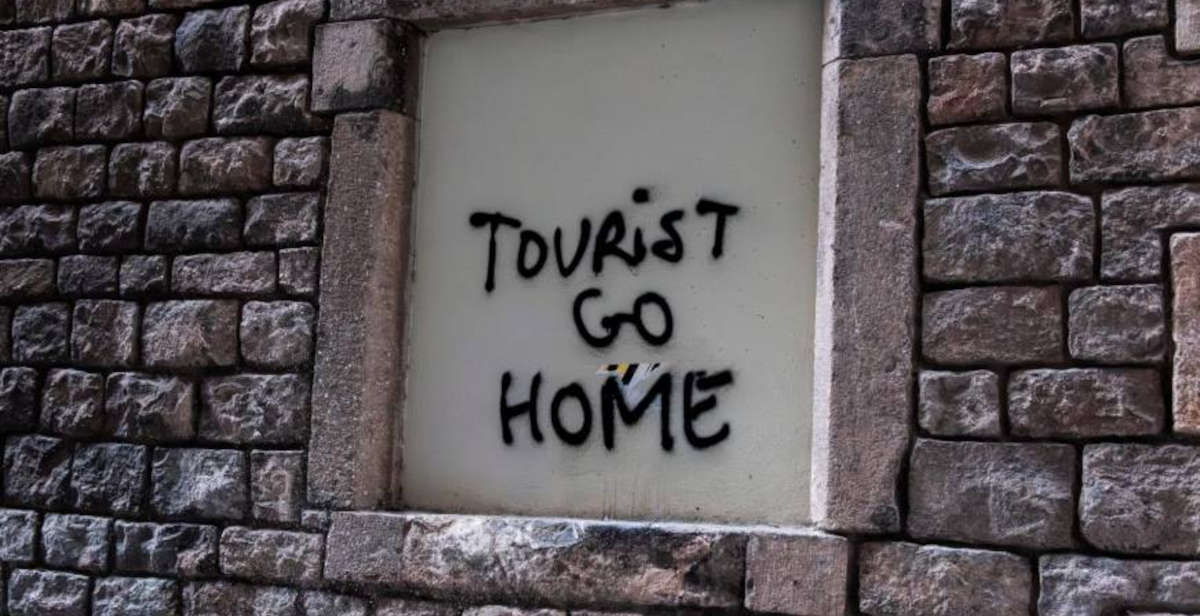“Tourist ho home,” “Yankee go home.” In the days when the City of Florence was “restoring” the lien to put homes in the historic center up for short rent, these writings against tourists appeared on the streets of Florence. As if it were a bad thing, on par perhaps with “racists go away,” tourism is acquiring a negative meaning identified in the responsible for ’distorting’ the normal daily life of those who inhabit what for others are places of holiday desire. We have seen this in Spain, and particularly in the Balearic Islands, Barcelona and the Canary Islands where residents have taken to the streets to protest and reject the presence of tourists in their homes. Demonstrations of thousands of people , complete with signs with the very slogan “tourist go home,” demonstrative actions such as the use of water pistols against tourists sitting at bar tables.
Of the signs that appeared in Florence’s Via delle Oche, in the Oltrarno, and on a parapet of the Ponte alle Grazie, Repubblica reported, and the one recalling the American “enemy,” the Yankee, is reminiscent of the 1970s protests. Florence is a city much chosen by Americans both for vacations and to have their children study a semester in Italy: suffice it also to think that there are 40 American universities (52 in Tuscany) that have a branch office on the banks of the Arno with 18,000 enrolled in courses each year.
The writings were quickly cleaned up, and they are a sign that the political debate over tourist rentals is heating up. For sure, the game is not over because after the TAR ruling last July the city administration had to run for cover by inserting a variant in the municipal urban planning instrument (the Poc - Municipal Operational Plan) making the stop to the authorization of new properties on this market back in place. The variant to the Operational Plan that inserts the rule to block new short tourist rentals in Florence’s Unesco center into the new urban planning tool was approved by the City Council on July 30. The stated aim is to encourage the permanence of residence in the historic center and improve the conditions of habitability through the inclusion of the distinction ’temporary residence’ within the typology ’residential use’ and thus establishing a ban on the establishment in the Unesco historic core of the use for temporary residence. “The variant adopted today is an important signal,” said Mayor Sara Funaro after the vote, “for a city in which it has become difficult to find rents for citizens who live here, for those who come to study or live in our city. We have a responsibility to give answers on this issue, to have on the one hand sustainable tourism and on the other an accessible city that can have more and more residents. We are convinced of the measures taken so far and of what we have renewed today in the City Council.” But appeals have already been announced, so this was only the second round.
The mayor commented with concern on the writing against tourists, “We want to avoid this. When I had several confrontations in recent days I had brought as an example the situation in Barcelona where so many citizens took to the streets and I said that in Florence we have to take action to avoid getting to this. The writing is not good. We must protect residents and work for sustainable tourism,” reads Repubblica, and from the same pages Federalberghi’s national president Bernabò Bocca, who is also president of the city’s banking foundation, Fondazione Cassa di Risparmio di Firenze, intervenes: he declares, “Everything we can afford less than to demonize tourism, even more so American tourism. I agree wholeheartedly with Mayor Funaro,” Bocca continues, "and with the battle on short rentals and for sustainable tourism. But Italy today lives off that tourism and we must welcome it with open arms. The tourist is seen as an enemy because the resident can no longer find housing and the Polimoda students no longer know where to stay also because of short rentals. Limiting or contingent them would solve the problem to a large extent. This government has done Chin which is a first step but we need a national law empowering mayors to govern the phenomenon. And it’s not a matter of defending private property because on the platforms ’Aunt Lina’ doesn’t rent , there are entities that invest on tourist rental apartments 365 days a year and in my house this is a commercial activity. Of overtourism, however, I do not want to hear about it, you cannot criminalize the sector and the domino effect must be stopped."
Photo: TTG Italy
 |
| Tourist go home: in Florence and beyond the anti-tourist writings |
Warning: the translation into English of the original Italian article was created using automatic tools. We undertake to review all articles, but we do not guarantee the total absence of inaccuracies in the translation due to the program. You can find the original by clicking on the ITA button. If you find any mistake,please contact us.